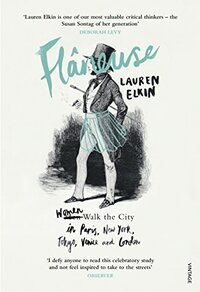You need to sign in or sign up before continuing.
Take a photo of a barcode or cover
231 reviews for:
Flâneuse: Women Walk the City in Paris, New York, Tokyo, Venice and London
Lauren Elkin
231 reviews for:
Flâneuse: Women Walk the City in Paris, New York, Tokyo, Venice and London
Lauren Elkin
adventurous
emotional
reflective
relaxing
slow-paced
Enjoyable read and the kind of thing that leads you to other books, so it's a win for that reason alone.
informative
reflective
medium-paced
reflective
slow-paced
This book was fine but not for me.
informative
reflective
slow-paced
informative
inspiring
reflective
slow-paced
challenging
informative
inspiring
slow-paced
There's a lot about this that I liked: the insistence that cities belong to women too, that there have always been women in public places, that there have always been women who walk with a purpose.
I liked the way Elkin captures the way you can fall in love with a city, how addictive they can be. She loves Paris in a way that I recognise - that feeling that begins as a kind of crush and ends with a feeling of home.
The rest of the book was frustrating:
1) Although, this was a book about women walking the city, she focuses almost exclusively on the artists and writers privileged enough to be able to do so. There are gestures towards intersectional thinking (a brief mention or two of the banlieues...that's it) but there is really no acknowledgement of the women who had to be on the streets to work, whether it was at a stall in the marketplace or selling posies in the street, or indeed, selling sex - street walkers. The writers/artists she writes about are all white (yes, even in the Tokyo chapter) and all middle class.
2) The chapter on Tokyo is just awful: solipsistic, patronising and othering. She claims that you can't walk in Tokyo (I beg to differ), that the food is weird and gross (in the city that has more Michelin-starred restaurants than any other....), that the men's eating habits are disgusting, that the women are complicit in their own infantalisation, that the cultural norms are offensive and strange - and on and on. This is the only chapter that she doesn't include a female artist or writer who thrived in the city: the most she can muster is a synopsis of Sophia Coppola's Lost in Translation.
3) She is weirdly apolitical - she is dismissive of the student protests of 1968 and says that she only saw the point of the marches against the Iraq war in 2003 when she found herself kettled by accident, ie. when it directly affected her.
4) She completely overlooks the intrusiveness of Sophie Calle's stalking of Henri B in Venice
5) The Agnes Varda chapter was great (and now I want to spend sometime watching her films) but a lot of it was taken up with a complete synopsis of Cleo de 5 a 7 - this is a problem throughout the book: she summarises rather than synthesises.
I liked the way Elkin captures the way you can fall in love with a city, how addictive they can be. She loves Paris in a way that I recognise - that feeling that begins as a kind of crush and ends with a feeling of home.
The rest of the book was frustrating:
1) Although, this was a book about women walking the city, she focuses almost exclusively on the artists and writers privileged enough to be able to do so. There are gestures towards intersectional thinking (a brief mention or two of the banlieues...that's it) but there is really no acknowledgement of the women who had to be on the streets to work, whether it was at a stall in the marketplace or selling posies in the street, or indeed, selling sex - street walkers. The writers/artists she writes about are all white (yes, even in the Tokyo chapter) and all middle class.
2) The chapter on Tokyo is just awful: solipsistic, patronising and othering. She claims that you can't walk in Tokyo (I beg to differ), that the food is weird and gross (in the city that has more Michelin-starred restaurants than any other....), that the men's eating habits are disgusting, that the women are complicit in their own infantalisation, that the cultural norms are offensive and strange - and on and on. This is the only chapter that she doesn't include a female artist or writer who thrived in the city: the most she can muster is a synopsis of Sophia Coppola's Lost in Translation.
3) She is weirdly apolitical - she is dismissive of the student protests of 1968 and says that she only saw the point of the marches against the Iraq war in 2003 when she found herself kettled by accident, ie. when it directly affected her.
4) She completely overlooks the intrusiveness of Sophie Calle's stalking of Henri B in Venice
5) The Agnes Varda chapter was great (and now I want to spend sometime watching her films) but a lot of it was taken up with a complete synopsis of Cleo de 5 a 7 - this is a problem throughout the book: she summarises rather than synthesises.
adventurous
informative
reflective
slow-paced





